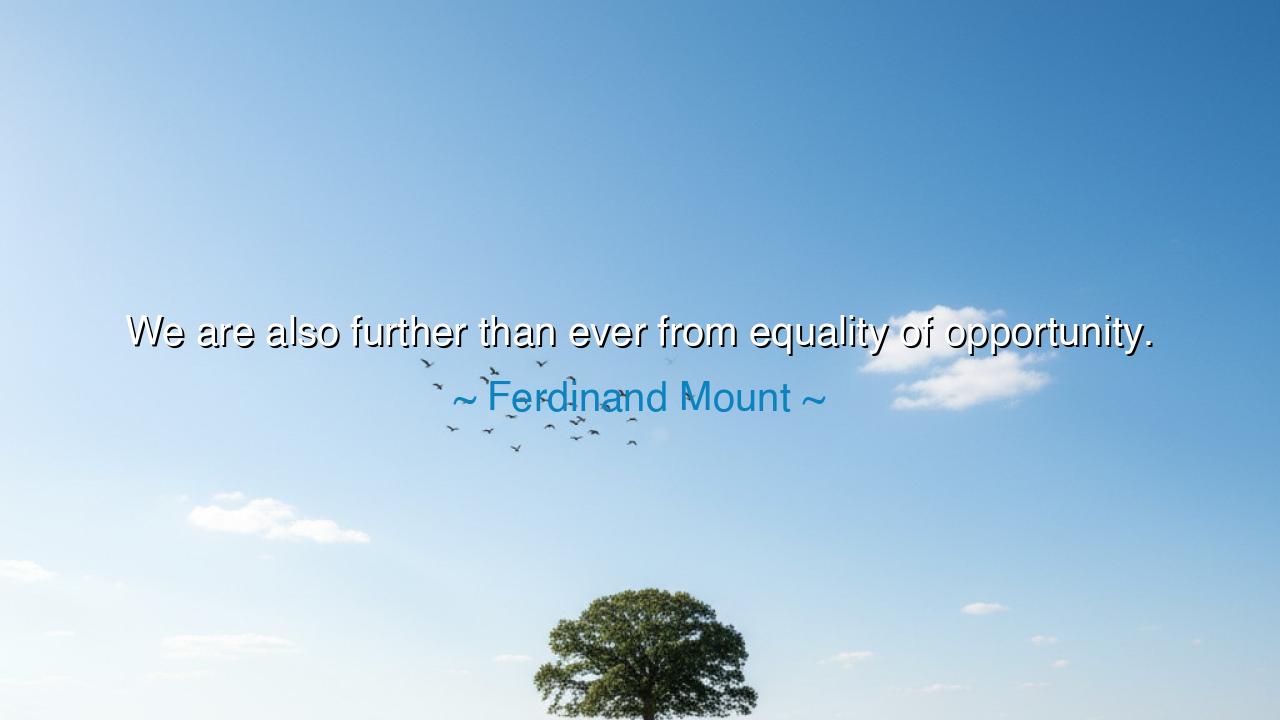
We are also further than ever from equality of opportunity.






In the solemn and perceptive words of Ferdinand Mount, we encounter a lament that speaks not merely of a single nation, but of the human condition itself: “We are also further than ever from equality of opportunity.” These words, though spoken in the tone of political reflection, strike with the force of moral prophecy. They reveal a truth that time itself has often tried to hide—that while civilization may advance in wealth, knowledge, and power, it can still drift away from justice. Mount, the English writer and thinker, warns us that progress without fairness is illusion, and that the true measure of a society lies not in what it has achieved, but in what it allows each soul to achieve.
The origin of this insight lies in Mount’s lifelong study of society and class. As a historian and essayist, he examined the hidden hierarchies that persist even in so-called modern democracies. He looked upon the towering structures of privilege—the schools that favor the few, the wealth that multiplies for the already rich, the voices that shout loudest because they were born in the halls of power—and saw that the promise of equality of opportunity had become a fading myth. His words remind us that the ladders of advancement, once held up as symbols of fairness, are now often pulled away or guarded by unseen gatekeepers. In this way, his lament becomes not cynicism, but a call to conscience.
Mount’s phrase “further than ever” carries the weight of irony and tragedy. It suggests that as the world has grown more connected, it has not grown more equal. Technology has opened new horizons, yet access to them remains uneven. Education, once hailed as the great equalizer, now reflects the inequalities of birth and circumstance. Even in free nations, the boundaries of class, race, and geography still shape the destinies of children before they can speak their own dreams. Thus, Mount’s wisdom cuts deep: he tells us that inequality today is not only material—it is systemic, invisible, and internalized, woven into the very fabric of modern life.
To illustrate this truth, let us recall the story of Horace Mann, the American reformer who championed public education in the nineteenth century. Mann believed that education was “the great equalizer of the conditions of men.” Yet even he warned that unless society invested equally in every child, education could become a weapon of privilege rather than a bridge of opportunity. More than a century later, his prophecy stands fulfilled: in many lands, the poor still study in the shadows while the privileged learn beneath the lamps of abundance. Mount’s words are a mirror held to that reality—a reminder that when opportunity narrows, freedom itself begins to hollow.
And yet, within this sorrowful truth lies a summons to action. Equality of opportunity is not a gift bestowed by the powerful—it is a field that must be tended by all. Each generation must reclaim it, just as farmers must till the soil anew each season. The work is not only political but moral. It begins in how we raise our children, how we treat the stranger, how we judge success—not by the gold one gathers, but by the fairness one practices. For as long as some are denied the chance to rise, no nation can truly call itself just.
Mount’s observation is also a warning against complacency. The illusion of fairness can be more dangerous than injustice itself, for it lulls the conscience into sleep. Many say, “The gates are open to all,” while ignoring the walls that still surround them. He reminds us that to see clearly is the beginning of reform—that those who look away from inequality are the very ones who allow it to grow. In this sense, his words carry the ancient wisdom of prophets: you cannot heal what you refuse to see.
So let this truth be carved into the hearts of all who seek a better world: do not mistake advancement for justice, nor comfort for equality. The road to fairness is long, and each generation must walk it again, bearing the burden of compassion and courage. Seek out the places where opportunity is denied—whether in your cities, your schools, or your own heart—and open the doors that others have closed. For equality is not a distant ideal; it is the measure of our humanity, renewed with every act of inclusion and every hand that lifts another toward the light.
And thus, in the enduring wisdom of Ferdinand Mount, we find both warning and hope. If we are indeed further than ever from equality of opportunity, then let us also be closer than ever to the awakening of conscience. For no distance is too great when the heart remembers its duty—to strive, to uplift, and to ensure that every soul, no matter its beginning, has the chance to fulfill its promise.






AAdministratorAdministrator
Welcome, honored guests. Please leave a comment, we will respond soon